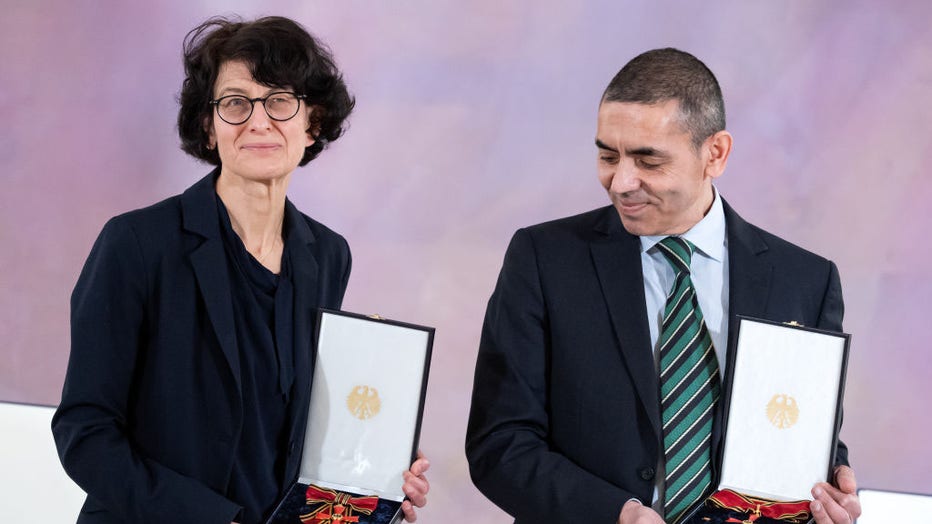Scientist behind Pfizer-BioNTech COVID-19 vaccine says next target is cancer
Extended interview: Expert explains how COVID-19 vaccines work and side effects after shots
Dr. Williams Moss, an epidemiologist and executive director of the International Vaccine Access Center at Johns Hopkins, explains how mRNA vaccines by Pfizer and Moderna work and why side effects are more likely after the 2nd dose.
BERLIN - The scientist who won the race to deliver the first widely used coronavirus vaccine says people can rest assured the shots are safe, and the technology behind it will soon be used to fight another global scourge — cancer.
Ozlem Tureci, who founded the German company BioNTech with her husband Ugur Sahin, was working on a way to harness the body's immune system to tackle tumors when they learned last year of an unknown virus infecting people in China.
Over breakfast, the couple decided to apply the technology they'd been researching for two decades to the new threat.
Britain authorized BioNTech's mRNA vaccine for use in December, followed a week later by the United States. Dozens of other countries have followed suit and tens of millions of people worldwide have since received the shot developed together with U.S. pharmaceutical giant Pfizer.
"It pays off to make bold decisions and to trust that if you have an extraordinary team, you will be able to solve any problem and obstacle which comes your way in real-time," Tureci told The Associated Press in an interview.

Özlem Türeci (L) and Ugur Sahin (r), founders of the coronavaccine developer BioNTech, stand during the award of the Grand Cross of Merit with Star of the Order of Merit of the Federal Republic of Germany on March 19, 2021 in Berlin, Germany. (Photo
Among the biggest challenges for the small, Mainz-based company were how to conduct large-scale clinical trials across different regions and how to scale up the manufacturing process to meet global demand.
Along with Pfizer, the company enlisted the help of Fosun Pharma in China "to get assets, capabilities and geographical footprint on board, which we did not have," said Tureci.
Among the lessons she and her colleagues learned was "how important cooperation and collaboration is internationally."
Tureci, who was born in Germany to Turkish immigrants, said the company reached out to medical oversight bodies from the start, to ensure that the new type of vaccine would pass the rigorous scrutiny of regulators.
"The process of getting a medicine or a vaccine approved is one where many questions are asked, many experts are involved and there is external peer review of all the data and scientific discourse," she said.
RELATED: Pfizer vaccine neutralized Brazil COVID-19 variant in lab study, researchers say
Amid a scare in Europe this week over the coronavirus shot made by British-Swedish rival AstraZeneca, Tureci dismissed the idea that any corners were cut by those racing to develop a vaccine.
"There is a very rigid process in place and the process does not stop after a vaccine has been approved," she said. "It is, in fact, continuing now all around the world, where regulators have used reporting systems to screen and to assess any observations made with our or other vaccines."
Tureci and her colleagues have all received the BioNTech shot themselves, she told the AP. "Yes, we have been vaccinated."
As BioNTech's profile has grown during the pandemic, so has its value, adding much-needed funds the company will be able to use to pursue its original goal of developing a new tool against cancer.
The vaccine made by BioNTech-Pfizer and U.S. rival Moderna uses messenger RNA, or mRNA, to carry instructions into the human body for making proteins that prime it to attack a specific virus. The same principle can be applied to get the immune system to take on tumors.
"We have several different cancer vaccines based on mRNA," said Tureci.
Asked when such a therapy might be available, Tureci said "that’s very difficult to predict in innovative development. But we expect that within only a couple of years, we will also have our vaccines (against) cancer at a place where we can offer them to people."
For now, Tureci and Sahin are trying to ensure the vaccines governments have ordered are delivered and that the shots respond effectively to any new mutation in the virus.
On Friday the couple is taking time out of their schedule to receive Germany's highest award, the Order of Merit, from President Frank-Walter Steinmeier. German Chancellor Angela Merkel, a trained scientist herself, will attend the ceremony.
"It’s indeed an honor," Tureci sad of the award. "Both my husband and I are touched."
But she insisted developing the vaccine was the work of many.
"It’s about the effort of many, our team at BioNTech, all the partners who were involved, also governments, regulatory authorities, which worked together with a sense of urgency," she said. "The way we see it, this is an acknowledgment of this effort and also a celebration of science."
RELATED: Pfizer COVID-19 vaccine blocks 97% of symptomatic cases, 94% of asymptomatic cases in Israeli study

